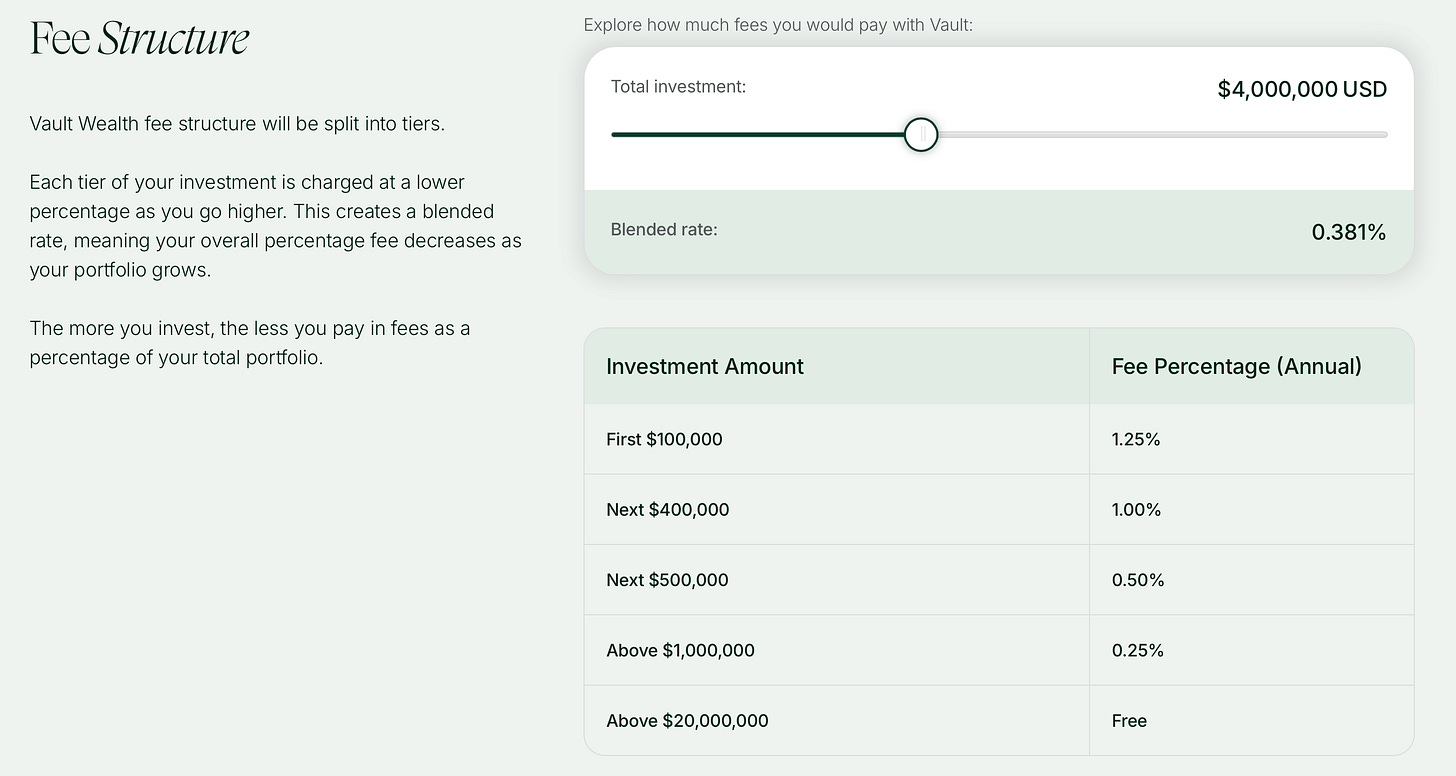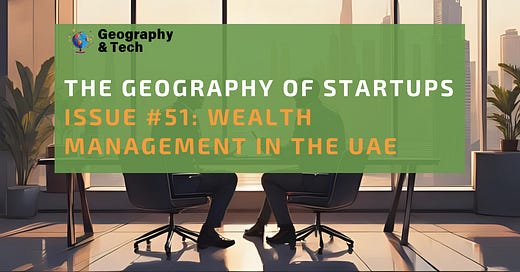It’s Tuesday, and today we’re talking about Vault Wealth, a newly launched wealth management startup from the UAE. Founded by Bilal Abou-Diab and Sami Abdul Hadi, the company announced a financing round led by Peak XV Partners, with continued support from previous investor Outliers VC.
The Product
First of its kind in the region, Vault Wealth is a digital private wealth platform focused on helping affluent individuals reach their financial goals through unbiased, long-term advisory services.
The premise behind the product is that the wealth management industry in MENA hasn’t been serving its clients as well as it should. According to Abou-Diab:
Vault was built with a simple premise: that affluent investors in MENA deserve better—better access, better alignment, and better outcomes.
So what does the product actually offer?
Vault Wealth isn’t a trading platform or anything like that. It uses Interactive Brokers—an American brokerage firm operating the largest electronic trading platform in the U.S.—as its custodian. The core of Vault’s offering is personalized advice on where to put your money. Through Interactive Brokers, investors can access a full range of financial markets: publicly traded stocks, private equity, venture capital, private credit, and real estate1—all facilitated through a single platform, via website or app.
The company blends human advisors with a degree of user autonomy that’s still rare in the wealth management space. You can meet with one of five human advisors to discuss your investment strategy—or, if you prefer, you can act independently and execute transactions on your own.
Alongside tailored strategies, Vault Wealth offers a few ready-made
SmartCash, a cash-deposit product with daily interest accrual and the ability to withdraw funds at any time.
A passive income product offering a fixed 5% monthly return, unaffected by interest rate changes.
Previously in closed testing, the company is now open to the public, targeting individuals with at least $100,000 in liquid assets. Over the past year, its assets under management have grown more than 300%, and the company claims that customers are tripling their deposits within 90 days of first funding.
The Business Model
1. A newly launched company that is trusted.
How do you build trust when you’re just entering the market? The key here is that Vault Wealth sits between the client and the broker, acting as an advisory overlay. Clients can de-link Vault from their accounts and work directly with Interactive Brokers, meaning they don’t need to worry about whether Vault will still be around in a year. Put simply: with Interactive Brokers, clients trust that their capital is safe; with Vault, they trust the advice. By partnering with one of the most established players in the market to safeguard client assets, Vault solves one of the biggest—if not the biggest—challenges in the financial industry.
2. Low barriers to entry throughout the whole journey.
Having $100,000 in liquid assets doesn’t seem like that high a bar. Compare that with players like Citi or HSBC, where the minimum threshold is often $1 million or more. With Vault, you can begin managing your wealth much earlier than you could at a traditional bank or investment institution. And once you do, the experience is as seamless as it should be—everything is managed through an app, and it actually works like you’d expect in today’s world.
3. The right incentives, regardless of a client’s goals.
One of the biggest differentiators is the fee structure. First, the advisory fee is flat across all products, so advisors aren’t incentivized to push clients toward one option over another. Second, Vault Wealth doesn’t charge transaction fees, meaning there’s no financial incentive for unnecessary buying or selling. What is incentivized are smart decisions—because the smarter your decisions, the more your wealth grows, and the more Vault earns in flat fees.

There are also a few other ways Vault Wealth generates revenue:
A platform fee for SmartCash—0.70% annually for balances under $1 million, and 0.40% for balances above that.
An Alternative Investment Arranging Fee of 1–2% for clients investing in private markets.
A $500/hour charge for financial planning sessions.
Still, these seem more like secondary income streams rather than the main revenue drivers.
The Local Angle
Accumulating wealth
29% of the UAE’s population holds over $100,000 in financial assets. With roughly 8.9 million adults in 2023 (84% of the 10.6 million total population), that comes out to approximately 2.4 million mass-affluent residents—a group almost 20 times larger than the country’s ultra-rich elite. Mean wealth per adult stands at $152,556, and it rose 18.7% in 2021 and another 11.7% in 2022, despite a volatile macro backdrop. In fact, the UAE is among the few countries where wealth per adult has been consistently rising since 2022.

As for the ultra-rich, Henley & Partners estimates that the UAE was home to 116,500 millionaires in 2023, and that number was projected to increase by 6,700 in 2024 alone. In Dubai alone, the number of millionaires more than doubledbetween 2014 and 2024.
There are two basic but important reasons why high-net-worth (HNW) individuals continue moving to the UAE:
Quality of life. 40% of Western HNW respondents cited “quality of life & investment opportunities” as their top reason for relocating. Violent crime is virtually nonexistent, and 93.5% of Abu Dhabi residents report feeling safe walking alone at night.
Taxes. With 0% personal income, capital gains, and inheritance taxes, the country is directly appealing to HNW individuals.
We can also look at how stable the country is and how, at least seemingly, unstable the rest of the world is—and appreciate the drive for relocation even more.
All that is to say that, regardless of how you slice it, Vault Wealth’s addressable market is increasing and that there are fundamental underlying factors for that increase. However, that market hasn’t been served well.
Untapped potential
Despite all that wealth, 41% of investable assets still sit in cash—steadily losing value. Other estimates suggest an even starker picture. In the U.S., around 85% of wealth is actively invested, while in the UAE, that figure is just 15%. There aren’t many recent numbers, but in 2009, mutual fund assets as a share of GDP stood at 0.3%; by 2015, that grew to 0.5%. Let’s assume it has since tripled to 1.5%—that’s still lower than Romania. In the world’s most developed financial markets (UK, USA, Singapore, etc.), the ratio exceeds 100%.
Why, you might ask? Well, the default investment choice for affluent UAE residents is still real estate. Property prices are rising 20% annually, and demand continues to surge. In Q1 2025, real estate deal volume jumped by 23%, reaching 42,422 transactions. To meet this, developers plan to introduce 73,000 new homes in 2025 alone. With 66% of renters planning to buy property, I don’t think we’ll see the market slowing down.
Another, albeit smaller, factor is remittances: the UAE facilitated nearly $50 billion in outbound remittances in 2022. While the vast majority of that isn’t coming from HNW individuals, a portion likely is—so it’s worth noting.
Fintech-first regulation
The UAE has been actively building a business-friendly environment. Fintech is no exception.
One notable example is the Category 4 “Advising & Arranging” license issued by Abu Dhabi Global Market (ADGM). This license offers digital investment platforms a relatively low-cost, streamlined entry into the market—it requires just $10,000 in base capital and allows firms to outsource the custody of client assets. That’s critical for most fintechs, which don’t hold client securities themselves. Thus, regulatory burdens are manageable, but the formal oversight is still there.
Startups can also experiment with their offerings through ADGM’s RegLab sandbox, a testing environment with flexible rules based on the company’s risk profile.
Regional expansion is becoming easier, too. In 2024, all six Gulf countries approved a fund passporting framework. This allows investment funds licensed in one GCC country to be marketed to professional—and eventually retail—investors across the entire region without requiring additional licenses.
The Roadblocks
Regional competition
I’ll continue to treat competition as a standing roadblock, so no need to bring it up in every article. But in this case, it’s particularly relevant. From what I’ve seen, most startups in the region are targeting the entire GCC from day one. Sure, they typically establish themselves in their home market first, but expansion into neighboring countries comes quickly—especially for fintech solutions aimed at affluent individuals, where the customer base is regionally mobile and culturally aligned. On top of that, international fintechs like StashAway are also entering the market.
Customer acquisition
Even though this is technically a B2C product, acquiring customers here plays out more like a complex B2B sale. You’re not winning people over with a few Instagram ads, you need to build trust and credibility. Early traction will likely come through word of mouth, but scaling beyond that is just different. It demands a strong, trustworthy brand that people are willing to believe in. That takes time, consistency, and sharp positioning.
Single-custodian dependence
Vault Wealth has deliberately avoided becoming a custodian for client assets, which is understandable—it would add serious regulatory and operational complexity. But that also means the business is fully dependent on Interactive Brokers. It’s not just about the (unlikely) risk of Interactive Brokers shutting down. When you build your business on essentially rented infrastructure, you inherit all kinds of secondhand risk: fee structure changes, API policy updates, regulatory shifts, and more. Any move by Interactive Brokers can have a direct impact on Vault’s service model, margins, or product roadmap.
The Upside
Simple math
I love this type of market where you have two rising tides lifting all boats. On one hand, there’s a growing pool of HNW individuals. On the other, a massive pile of capital that’s chronically underinvested. Both are expanding. That’s a compelling.
Scaling beyond the UAE
The company has already stated its intention to expand into other regional markets. And if momentum toward a unified regulatory environment continues, cross-border scaling should become far easier. The cultural and behavioral differences across the GCC aren’t dramatic, so adoption challenges will likely be similar. If Vault figures out how to solve them in the UAE, chances are they’ll know how to solve them elsewhere too.
The changing face of a HNW individual
The UAE is expanding its Golden Visa program to include more categories of high-net-worth individuals, which will attract people already familiar with modern wealth management tools. At the same time, a large share of family-owned SMEs is transitioning from founders to second-generation heirs—many of whom are far more comfortable with app-based financial advice and more likely to diversify beyond real estate. That shift in mindset could unlock a new wave of demand.
The Takeaway
It’s fascinating to see an untapped market in a place that feels like it should already be oversaturated. When you think of the UAE—with everything they’re experimenting with, how quickly they adopt emerging trends, how modern things feel on the ground, and, to be blunt, how rich the place is—you don’t immediately think: “Sure, they offer ChatGPT for free to every citizen, but there are probably millions of people just sitting on piles of cash.” And yet, that’s exactly what’s happening.
1: Investing in private markets is only available to clients classified as Professional Clients under FSRA rules. For individuals, that basically means having at least $1 million in net assets and demonstrating a sufficient level of experience and understanding of financial markets and relevant products.







